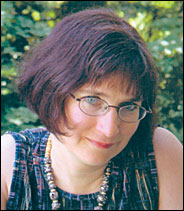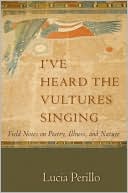In “From the Bardo Zone,” Lucia Perillo writes about visiting a creek where salmon come to spawn and die. “Don’t get me wrong; I’m grateful for the people who push me out when I bog down in the mud,” she says. “But it drives me crazy when someone tries to take me aside (that is, if you can take someone on a motorized vehicle aside) to say: I think it’s great someone like you is out here. Someone like me, meaning not like them …” How strange that some of her reviewers express their admiration for her book of essays in the same manner. How courageous! How honest! What an unflinching eye!
 Perillo is one of our very best poets, and a damned good essayist. She’s supposed to write this well. Her candor isn’t a by-product of having been diagnosed with multiple sclerosis in the mid-80s. She was made from the beginning to reveal the other side of life via language.
Perillo is one of our very best poets, and a damned good essayist. She’s supposed to write this well. Her candor isn’t a by-product of having been diagnosed with multiple sclerosis in the mid-80s. She was made from the beginning to reveal the other side of life via language.
Blunt, mordant, impatient, attentive: This is the tone throughout I Heard the Vultures Singing, a book of 16 essays shuttling between two main reference points – the non-human world of the Pacific Northwest, and the debilitation of the body. In “Knowledge Game” she says, “It takes courage to spend time considering nature when your life is circumscribed, because this means considering what you have lost.” She isn’t making a case for her bravery, but rather pointing out something she knows and we don’t, namely that gazing at the beauty of nature may be trying. This book is largely intent on wrecking given standards for the appreciation of life, and replacing them with the chance to look intently at life itself. Perillo is greatly talented in situating us — in a place where we may experience an impingement, life intruding on us. The function of the chastened view from her wheelchair is to disrupt our expectations while depriving us of opportunities to feel virtuous about it. The physically stricken person tells us that nature abhors a plenitude and achieves some of its greatest accomplishments while scrounging through the ruin and decay.
Perillo the essayist takes on the terminology of illness in “Definition of Terms”: “As a member of the population to which the word applies, though, I’m given some latitude in my use of cripple as an aggressive form of self-description. In doing so I may intend to suggest that I have become hardened to its connotations, or that I am a realist about my body’s state, or that I am using the word to announce my affinity with a subculture that aspires to outlaw status. Each of these meanings enshrines some sort of little fib. As in the obvious fact that my outlaw status is belied by my helplessness, which causes any swaggering to possess a tinge of pathos. If I tried to swagger, I would fall down.”
But it is Perillo the poet who goes beyond the obvious ironies in our devotion to euphemisms. She won’t spare herself; she is attuned to her fibs. Former park ranger and trekker of wilderness trails, Perillo the poet has established a hard-won boundary between herself and the world. Once the “no trespassing” sign has been posted, the poet then projects a voice back to the world. But the poem always draws its line in the dirt. The poem isn’t so altruistic. Its generosity is for the work at hand. She writes in “A Cripple in the Wildernness,” “I used to be a naturalist, but, in all honesty, what I liked more than the names and facts and maybe even the sights of nature was the opportunity that being a naturalist gave me to walk around in the woods.” To walk alone. (The sentence is perfect except for “in all honesty,” an annoying phrase which she has earned the right to exclude.) Nevertheless, her essays are often very much about names and facts: bats, gulls, salmon, terrain.
 As part of its shift between world and body, I’ve Heard the Vultures Singing takes up poets and poetry, including some reflecting on Perillo’s development. About her first book, Dangerous Life, she writes, “What was it like? Answer: Full of much bad writing. I had too much investment in the autobiographical myth, which I thought was necessary because I lacked the inventiveness not to write about actual life, and I thought that actual life required a grand myth to be interesting … I hadn’t gotten wise to Emily Dickinson yet, a poet who derived her outlaw spark from the sly rebellion of her strange punctuation. To put the brigand into the poem itself, not the autobiography, this is the harder trick.” I’m quoting here from “Bonnie Without Clyde,” an essay about the freedom to court danger and behave badly. “My life has become not just tame, it transpires now almost without event, save for the drama of an accelerating physical decline. This physical dilapidation only makes the outlaw more cherished, seeing as she is so improbable,” she writes. She can spell this out precisely because it is mere autobiography. I read this fine piece listening for the brigand – since I deeply admire her poetry.
As part of its shift between world and body, I’ve Heard the Vultures Singing takes up poets and poetry, including some reflecting on Perillo’s development. About her first book, Dangerous Life, she writes, “What was it like? Answer: Full of much bad writing. I had too much investment in the autobiographical myth, which I thought was necessary because I lacked the inventiveness not to write about actual life, and I thought that actual life required a grand myth to be interesting … I hadn’t gotten wise to Emily Dickinson yet, a poet who derived her outlaw spark from the sly rebellion of her strange punctuation. To put the brigand into the poem itself, not the autobiography, this is the harder trick.” I’m quoting here from “Bonnie Without Clyde,” an essay about the freedom to court danger and behave badly. “My life has become not just tame, it transpires now almost without event, save for the drama of an accelerating physical decline. This physical dilapidation only makes the outlaw more cherished, seeing as she is so improbable,” she writes. She can spell this out precisely because it is mere autobiography. I read this fine piece listening for the brigand – since I deeply admire her poetry.
One of the most engrossing essays here is “Sick Fuck,” a concentrated look at her illness, starring her candid and sometimes withering tone. It’s also a sly treatise on sex — with or without someone with a serious illness. A master of controlled voice, Perillo works up to a punchline with tough confidence:
“Even though the disappearance of one’s young body is a tired lament, it is especially galling to me not only because of how I once worshipped at the temple of physical fitness, but also because of the extremity of my body’s being sacked. When I asked Jim the other day how he could stand making love to such a freak, he said: ‘That’s what eyelids are for.’” And so the pair keep their eyes shut to avoid that element in Louise Glück’s poem “Mock Orange,” “the low, humiliating / premise of union.” She writes, “The face is embarrassing and also frightening: the body at its moment of utmost concentration, as if it were in the midst of committing a violent crime.” Throughout this remarkable essay, Perillo’s compromised condition is perhaps less the reason for these attitudes and habits than their critical context — and thus, a bridge to our own situations. “Joining forces with someone else means a respite from fighting the body’s ravages on one’s own. Strife loves company,” she says, “especially strife in which one is bound to go down the loser.” In another essay, “Two-Man Boat,” in which Perillo reluctantly goes kayaking with husband Jim, she says, “Our kayaking is like sex in that emotional authenticity is not always a prerequisite, though it is supposed to be acquired by the time the activity comes to its conclusion.” Lines like this, throwing off sparks throughout these essays, are quintessential Perillo.
After sidetrips to Haig Najarian’s Sex Lives of Animals Without Backbones and Pedro Almodovar’s movie Talk to Her (“which builds its plot around the erotic potential in the afflicted body”), she untangles her thoughts about sanguine possibilities and stricken flesh. Perillo says, “While last year’s therapist felt that my giving up on hope had darkened my outlook, I think hope shackled me to my body as it dropped like dead weight to the floor of the sea. And surrendering hope has left me feeling unburdened, lighter, strangely giddy as I float.” This leads to Georges Bataille’s definition of eroticism (“assenting to life up to the point of death”) and his notion that “taboos arise in order that the body’s interior and exterior not be mixed.” Perhaps poetry is an artful (and therefore sneaky) violator of this taboo, shuffling the inside and the outside, blurring the line between them, and trying to mix it up with the reader’s optic fluids.
The “bardo” in the title of the final essay, “From the Bardo Zone,” refers to the Bardo Thodol, “the Tibetan title of what English speakers have traditionally called The Tibetan Book of the Dead.” Bardo suggests “the in-between, the zone between two states of form.” This piece centers on the mass deaths of spawning salmon; she speculates on the emotive capabilities of dying fish, referring to the findings of neuroscientist Antonio Damasio regarding the snail: “Touch the snail’s gill and its heart rate shoots up, ink will shoot out. The snail may not be able to do the processing of these emotions (which is what would turn emotion into something more akin with human feeling), but their presence is necessary to guide the actions the creature will need to make in order to survive. It’s emotion, claims Damasio, that enables us to read our environment and keep ourselves alive.” Letting us make the connections, Perillo wheels around the trap of making too profound a connection with her situation. But it’s clear nonetheless. These essays track the ways in which Lucia Perillo is keeping herself alive. It is emotion, trained on the “actual life,” that lets her read her environment – and to reach us so movingly and with such tough love.
[Published by Trinity University Press, 228 pages, hardcover, $24.95]
Lucia Perillo is the author of four books of poetry: Dangerous Life, The Body Mutinies, The Oldest Map With the Name America, and Luck Is Luck.